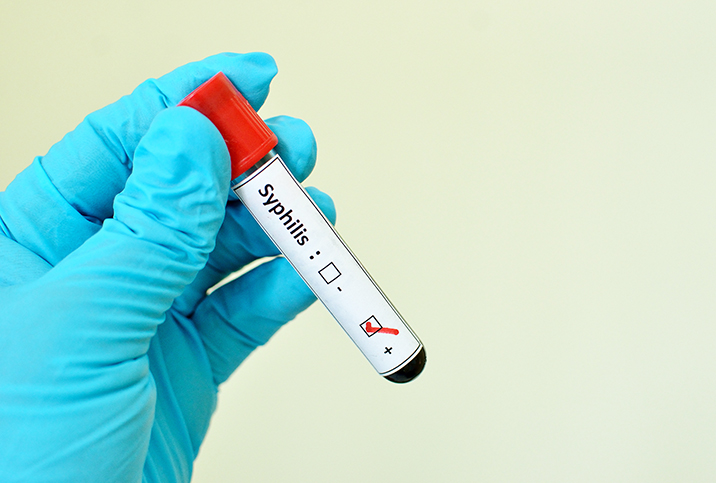How Serious Is Syphilis?

Syphilis is a sexually transmitted disease (STD) that affects both men and women. It can be spread through sexual contact with an infected partner, and it can affect your genital area, mouth, lips and anus—even your brain.
Syphilis has multiple stages, and symptoms vary throughout the stages, though you may not notice any symptoms for years. And that's not good, because syphilis can cause lasting damage to multiple systems in the body.
Primary syphilis
During the primary stage of syphilis, you may notice a small, painless open sore in your genital area. It often appears at the site where syphilis bacteria enter the body, such as at the vagina or near the rectum. The sore, or multiple sores in some cases, can appear about three weeks after you are exposed to syphilis. Sores usually heal on their own within three to six weeks, but this does not necessarily mean the syphilis is gone for good. The syphilis bacteria may lie dormant in your body.
Secondary syphilis
Secondary syphilis can occur a few weeks after the original sore heals. During this stage, you might notice a rash that eventually covers your entire body, including the soles of your feet and palms of your hands. You might also have wart-like sores in your genital area or mouth, and experience muscle aches, hair loss, sore throat, fever and swollen lymph nodes.
These symptoms might disappear within several weeks, or they can come and go for up to a year.
How untreated syphilis progresses
If syphilis goes undetected and untreated, the disease can progress from the secondary stage to a hidden, or latent, stage. The latent stage might last several years, during which time you likely won't have symptoms at all.
About 15 to 30 percent of people who don't treat their syphilis will develop tertiary syphilis. This stage of the disease can damage an infected person's eyes, nerves, brain, blood vessels, heart, bones, joints and liver. When untreated syphilis damages one's brain and nervous system, it is known as neurosyphilis.
Congenital syphilis
Pregnant women infected with syphilis can pass the disease to their baby during pregnancy or childbirth. Babies born to women infected with syphilis might have no symptoms, or a rash on their hands and feet. However, as the newborns grow older, symptoms can include tooth deformities, deafness and collapse of the nasal bridge.
Syphilis-infected babies have a higher risk of premature birth and even death.
Risks factors for contracting syphilis
You can contract syphilis by having oral, vaginal or anal sex with an infected partner.
Bacteria enter your body through tiny abrasions or cuts in your skin, and in some cases, syphilis can spread through lesions during kissing. A person with syphilis sores is more susceptible to contracting human immunodeficiency virus (HIV) during sexual contact with an infected partner.
Anyone who is sexually active can contract syphilis, but certain factors increase the risk, such as having unprotected sex (not using a condom) with an infected partner, having multiple sex partners, men having sex with men, and HIV infection.
Act if you suspect you have syphilis
Your doctor or a local clinic can diagnose syphilis using various tests. When caught and treated early, syphilis is highly curable with antibiotics, and a follow-up blood test can confirm when the disease is gone. Until your treatment is complete, though, you should avoid sexual contact. You also should alert any sexual partners to the possibility they might be infected and urge them to get tested.
Even after you've been treated for syphilis, you can get reinfected. There's no vaccine for syphilis, but using a condom each time you have sex and regularly undergoing STD tests, especially if you have multiple partners, can greatly reduce your risk of contracting it.
Abstaining from oral, vaginal and anal sex is the most reliable way to avoid getting syphilis, and having just one mutually monogamous partner is another prevention strategy.
Having multiple partners increases the risk of contracting any type of STD or sexually transmitted infection (STI), including syphilis, so it is important to take precautions with regular testing, open and honest discussions with your partner(s), and following through with any treatments your doctor recommends.
Recognize the signs and symptoms of syphilis and get tested and treated when necessary. Those are the best ways to optimize sexual health and reduce your risk of serious complications.
















